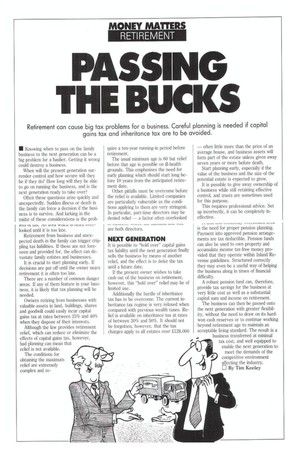PASSING THE BUCKS Retirement can cause big tax problems for
Page 62

If you've noticed an error in this article please click here to report it so we can fix it.
a business. Careful planning is needed if capital gains fax and inheritance tax are to be avoided.
• Knowing when to pass on the family business to the next generation can be a big problem for a haulier. Getting it wrong could destroy a business.
When will the present generation surrender control and how secure will they be if they do? How long will they be able to go on running the business, and is the next generation ready to take over?
Often these questions arise quickly and unexpectedly. Sudden illness or death in the family can force a decision if the business is to survive. And lurking in the midst of these considerations is the prob1C111 UI Lax. nu dLca wutt.0 L uncJi vrcllooked until it is too late.
Retirement from business and unexpected death in the family can trigger crippling tax liabilities. If these are not foreseen and provided for, the effect can devastate family estates and businesses.
It is crucial to start planning early. If decisions are put off until the owner nears retirement it is often too late.
There are a number of common danger areas. If any of them feature in your business, it is likely that tax planning will be needed.
Owners retiring from businesses with valuable assets in land, buildings, shares and goodwill could easily incur capital gains tax at rates between 25% and 40% when they dispose of their interests.
Although the law provides retirement relief, which can reduce or eliminate the effects of capital gains tax, however, bad planning can mean that relief is not available.
The conditions for obtaining the maximum relief are extremely complex and re quire a ten-year running-in period before retirement.
The usual minimum age is 60 but relief before that age is possible on ill-health grounds. This emphasises the need for early planning which should start long before 10 years from the anticipated retirement date.
Other pitfalls must be overcome before the relief is available. Limited companies are particularly vulnerable as the conditions applying to them are very stringent. In particular, part-time directors may be denied relief — a factor often overlooked I • ..... ',Jo...a, IA Or AM.) 4,4.4”.4 “111111 34, are both directors.
NEXT GENERATION It is possible to "hold over" capital gains tax liability until the next generation finally sells the business by means of another relief, and the effect is to defer the tax until a future date.
If the present owner wishes to take cash out of the business on retirement, however, this "hold over" relief may be of limited use.
Additionally the hurdle of inheritance tax has to be overcome. The current inheritance tax regime is very relaxed when compared with previous wealth taxes. Relief is available on inheritance tax at rates of between 30% and 50%. It should not be forgotten, however, that the tax charges apply to all estates over 2128,000 — often little more than the price of an average house, and business assets will form part of the estate unless given away seven years or more before death.
Start planning early, especially if the value of the business and the size of the potential estate is expected to grow.
It is possible to give away ownership of a business while still retaining effective control, and trusts are sometimes used for this purpose.
This requires professional advice. Set up incorrectly, it can be completely ineffective.
is the need for proper pension planning. Payment into approved pension arrangements are tax deductible. Pension funds can also be used to own property and accumulate income tax-free money provided that they operate within Inland Revenue guidelines. Structured correctly they may even be a useful way of helping the business along in times of financial difficulty.
A robust pension fund can, therefore, provide tax savings for the business at very little cost as well as a substantial capital sum and income on retirement.
The business can then be passed onto the next generation with greater flexibility, without the need to draw on its hardwon cash reserves or to continue working beyond retirement age to maintain an acceptable living standard. The result is a business transferred at minimal tax cost, and well equipped to enable the next generation to meet the demands of the competitive environment affecting the industry. El By Tim Keeley




































































































